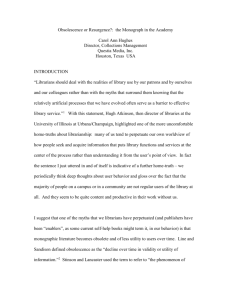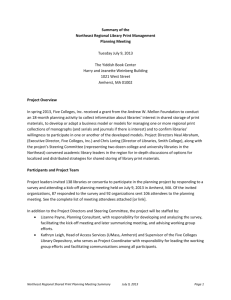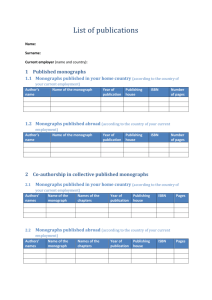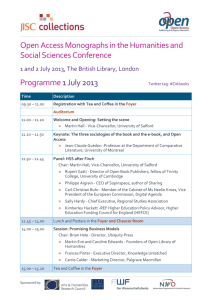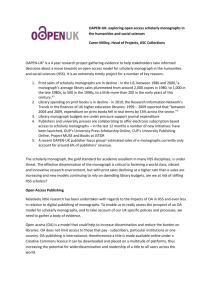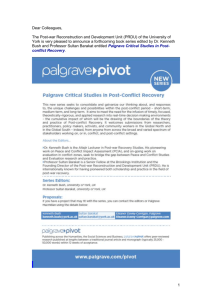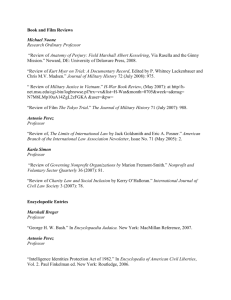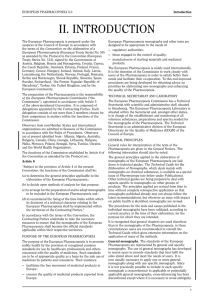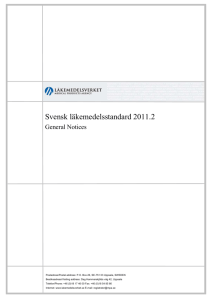Goals and Criteria
advertisement
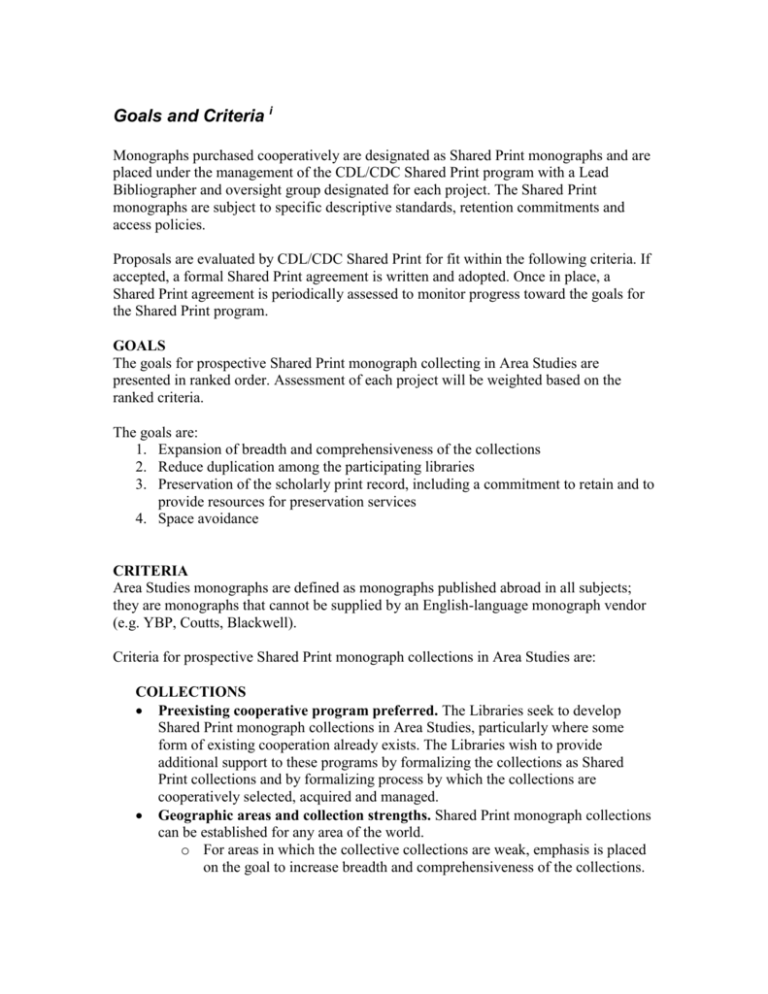
Goals and Criteria i Monographs purchased cooperatively are designated as Shared Print monographs and are placed under the management of the CDL/CDC Shared Print program with a Lead Bibliographer and oversight group designated for each project. The Shared Print monographs are subject to specific descriptive standards, retention commitments and access policies. Proposals are evaluated by CDL/CDC Shared Print for fit within the following criteria. If accepted, a formal Shared Print agreement is written and adopted. Once in place, a Shared Print agreement is periodically assessed to monitor progress toward the goals for the Shared Print program. GOALS The goals for prospective Shared Print monograph collecting in Area Studies are presented in ranked order. Assessment of each project will be weighted based on the ranked criteria. The goals are: 1. Expansion of breadth and comprehensiveness of the collections 2. Reduce duplication among the participating libraries 3. Preservation of the scholarly print record, including a commitment to retain and to provide resources for preservation services 4. Space avoidance CRITERIA Area Studies monographs are defined as monographs published abroad in all subjects; they are monographs that cannot be supplied by an English-language monograph vendor (e.g. YBP, Coutts, Blackwell). Criteria for prospective Shared Print monograph collections in Area Studies are: COLLECTIONS Preexisting cooperative program preferred. The Libraries seek to develop Shared Print monograph collections in Area Studies, particularly where some form of existing cooperation already exists. The Libraries wish to provide additional support to these programs by formalizing the collections as Shared Print collections and by formalizing process by which the collections are cooperatively selected, acquired and managed. Geographic areas and collection strengths. Shared Print monograph collections can be established for any area of the world. o For areas in which the collective collections are weak, emphasis is placed on the goal to increase breadth and comprehensiveness of the collections. o For areas in which the collective collections are strong, emphasis is placed on the goal for streamlining and economizing purchases while still maintaining collection breadth and depth. Languages and geographic areas. Candidates for Shared Print include monographs that are published in languages or geographic areas that continue to be important for research but where it may be less critical o To maintain holdings at a local library or o To continue to acquire many copies across libraries Collection distinctiveness and Shared Print. Monographs in areas in which most libraries have a research interest but no single library has a strong stake in acquiring the material to achieve collection distinctiveness are preferred. External funding. Areas in which cooperative collection development may support applications for external funding (including D.O.E. Title VI Funding for National Resource Centers.) Proposals that do not meet this criterion are acceptable. Research monographs. Monographs for teaching and instruction are not candidates for Shared Print. Proposals may include research monographs, monographic series, monographic sets, government publications that are annuals, monographs, monographic series or sets but not journals or publications with a publication frequency greater than 2/year. Not eBooks. Monographs that are not available for purchase in electronic format (eBooks) and are not expected to be available electronically in the foreseeable future. Not Microforms. Not Newspapers. Not Serials. SELECTION AND COLLECTION MANAGEMENT Selection and order visibility. An international book agent or third party (e.g. OCLC) exists that is capable of providing tools or mechanisms to support visibility of selections and orders across libraries, as well as the Shared Print approval plan(s) and profile(s). Each library needs the ability to see when another has acquired an item, at the point of order, and the terms of agreement. International business environment and skills. Candidates for Shared Print include monographs that are difficult for several libraries to purchase or process because o Specialized language and cultural skills are needed among bibliographers and acquisitions staff to evaluate and select monographs and maintain ongoing international business relationships o Specialized catalogers or services are needed to catalog the monographs in original scripts o International distribution channels are difficult to manage. COOPERATION Oversight group. Each participating library is committed to designating a bibliographer, cataloger and acquisitions professional to the project as part of an oversight group(s) responsible for the Shared Print collection. Lead Bibliographer. A Lead Bibliographer can be identified and is committed to serve as the primary liaison between the vendor, Shared Print Manager and oversight group. Minimum number of participating libraries and decision-making. At least two (2) libraries must agree to collaborate to purchase and process the monographs and the consortia of libraries (and extramural partners, if any) must agree to make collection management decisions collaboratively, as they arise. Value and scale of cooperation. The value of the research monographs and scale of the project justifies the expenditure of time and resources to put in place infrastructure for cooperative collection development. Length of agreement. The libraries are able to commit funds and resources (human resources, tools, and services) to acquiring monographs in this area for a minimum of five (5) years after which the agreement is reviewed and may be renewed for multiyear intervals. Excerpted from “CDC/CDL Task Force report on prospective Shared Print monographs (October 2008)” [.doc] i
